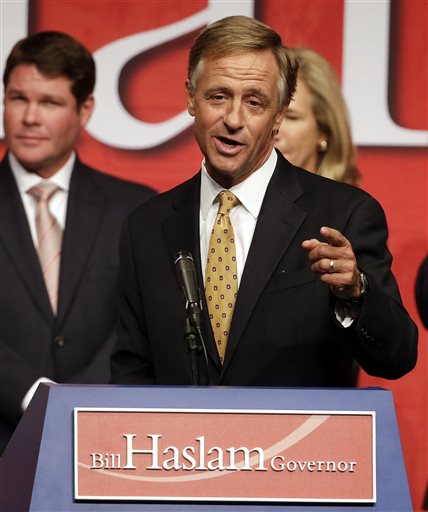NASHVILLE - Gov. Bill Haslam said Wednesday that without new transportation money Tennessee must soon decide whether to stop building new roads and bridges and simply stick with maintaining those it already has.
But the governor told reporters that he hasn't decided whether 2015 is the year to ask state lawmakers to increase Tennessee's gas tax -- it would be the first one in 25 years -- or else pursue new funding mechanisms.
Or he might simply wait.
"There's no way the state can continue on the path we're on now. The math just doesn't work," Haslam said. "I'm not saying we're going to ask the Legislature to do it, or they're going to ask us. We're evaluating the needs, and is this the right time to do that or not ... we obviously don't want to do that until we have to."
At the same time, the governor said he is "not going to go put a Band-Aid on it and say, 'Oh good, maybe we'll get another three, four years down the road.' We actually want to look at something that is a strategic long-term view."
Tennessee's gas tax -- now set at 21.4 cents per gallon -- was last raised in 1989. The same goes for the 18.4 cents per gallon diesel tax. The 1.4 cents in both cases goes for inspection fees.
But higher vehicle fuel efficiency standards and increased use of hybrid and electric cars are taking their toll on road funds. They're not just stalled; they're going slightly in reverse and the situation will likely grow. While that's good for the environment, Haslam said, it's hard on keeping one of the nation's top five road systems going. Unlike most states, Tennessee funds roads in a pay-as-you-go basis and doesn't borrow money by issuing bonds.
Haslam's comments came after Transportation Commissioner John Schroer discussed the situation as agency chiefs this week present their proposed annual spending plans to the governor.
Schroer warned of a transportation funding "gap" with an estimated backlog of $8 billion billion worth of projects.
The department has a current budget of $1.84 billion with $822.2 million coming from the state, $975.7 million from the federal government and $42 million for local governments. Most of that is for roads, highways and interstates.
The $1.84 billion is expected to shrink by $30 million next year.
Congress has made the situation worse, Schroer said. Federal lawmakers have passed any number of stop-gap funding measures, making long-term spending plans difficult and forcing the state to delay projects even more. Right now, Congress has a Dec. 11 deadline to act on a new stop-gap bill to keep funding going.
Put it all together, Schroer told Haslam, and "we're quickly becoming a maintenance-only state ... It reduces our capacity to build new capacity." And with a growing population, that's going to mean more clogged transportation arteries.
In recent years, state lawmakers with considerable encouragement from the state's powerful road builders association have discussed changes to funding. They include indexing taxes to the price of fuel like Georgia does. Given the recent drop in fuel prices, users wouldn't notice that as much but would see increases in their taxes as prices rise.
Toll projects have also been floated.
But earlier this year, Schroer drew newspaper headlines when he called the current funding system "archaic" and in need of replacement.
"We have to have some sort of usage fee, using how many miles you travel and how much does your vehicle weigh," Schroer was quoted saying at the time by the Knoxville News Sentinel.
Contact staff writer Andy Sher at asher@timesfreepress.com or 615-255-0550.

